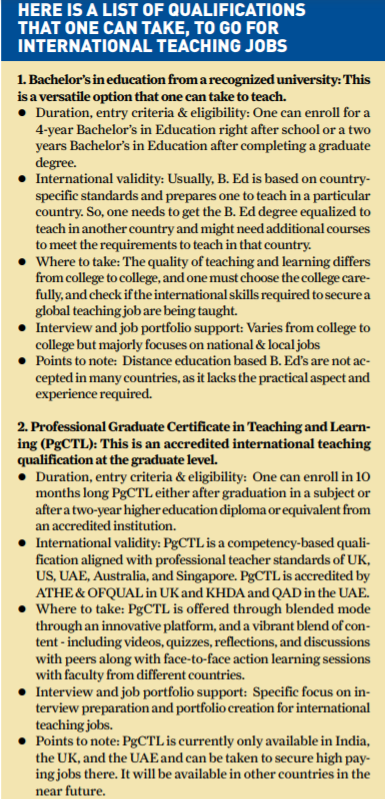While many people dream of living abroad and having an international job, it can be a dream come true for those interested in a teaching career. Being a qualified and trained teacher is an asset that is high in demand in many countries, and this demand is growing year on year. Schools around the globe are ready to pay for the right talent and skill set and are looking for teachers who can create an impact. Figuring out how to get an international teaching job can be challenging, but with a plan and efforts in the right direction, it’s not out of reach.
Every country has its own set of standards when it comes to the hiring of teachers. These standards define the skill set required to get selected and teach there. These skills and standards are called teaching requirements and are usually very specific to the country. So, to get a well-paying job with a good international school, one must be prepared to go beyond the boundaries of standard training and rise above hundreds of other teachers. Let’s explore these requirements and try to answer some of the critical factors that one must consider while planning to teach abroad.
Qualifications and skills
There are some requirements in terms of qualifications to teach abroad. First of all, one needs to have a Bachelor’s degree, a recognised teaching qualification, and proficiency in English. A bachelor’s degree can be in any field and usually defines the subject that one can teach. So, an engineering student can teach any of the subjects, right from mathematics to sciences, he/she studied during the degree. So, in this case, a bachelor’s degree that’s Bachelor of Engineering becomes a subject qualification. The next essential requirement is a teaching qualification. Qualifications like B.Ed, PgCTL, and international diplomas in teaching are some of the teaching qualifications, and one must find the right fit before enrolling in any of these. And since most of the international teaching will be in English, the proficiency in the form of an IELTS score above band 6 is a must.
One might get the qualification but being ready to lead a classroom full of 21st century international students requires a specific skill set. The best way to prepare yourself for teaching abroad is to obtain an internationally accredited teaching qualification that will equip you with 21st century pedagogical skills needed and get you international teaching opportunities. Choosing the right teaching qualification can be overwhelming. So, to make the right decision one must ask:
Does this qualification offer skills that meet global teaching standards?
The difference between a qualified and not qualified teacher is not about the qualifications. Getting a qualification is an easy part, indeed. What’s required is the correct skillset, and it’s imperative to choose a qualification that comes with international teaching standards-based teaching skills. These qualifications usually come with practical action-learning experiences and are built on constructive learning. They create relevant & engaging educational experiences that successfully address the specific developmental needs of learners.
Does the qualification prepare for job placement and provide assistance to find teaching opportunities abroad?
Specific countries look for particular skill sets and hire based on evaluation against teaching standards. So, being ready includes proper training to ace the interview and to showcase the teaching skills. By going through a program that offers assistance in securing international job interviews, chances of securing a global teaching job are higher. One must look for a qualification with a track record of international interview opportunities and one that schools prefer to hire from. But securing an interview is only half the battle won. So, another critical point to check will be that:
Does this qualification offer a pre-interview preparation and teaching portfolio?
While getting an international job interview might be a task in itself, it’s just half the battle won. What happens in the interview decides the fate of the candidate. These job interviews are highly technical and require thorough preparation on the roles that teachers take. These interviews can cover topics that range from child psychology, learning theories to rubric creation, and differentiation. Being ready with the teaching skills and knowing how to present in the interview are two different things, and one must look for a qualification that prepares for the interviews. In fact, it’s best suited, if one has a teaching portfolio to showcase their skills measurably. So, ensure that the qualification helps in building one.
Does the qualification provide further development opportunities to grow in the job?
The best international schools always look for the best talent and prefer people who keep growing continuously. They provide growth opportunities for candidates who are lifelong learners. They prefer candidates who spend their time and energy in continuous professional development. So, to grow in the teaching job, one must keep updating with new developments in education and pedagogy.
The author is a cognitive scientist and founder of Suraasa
























